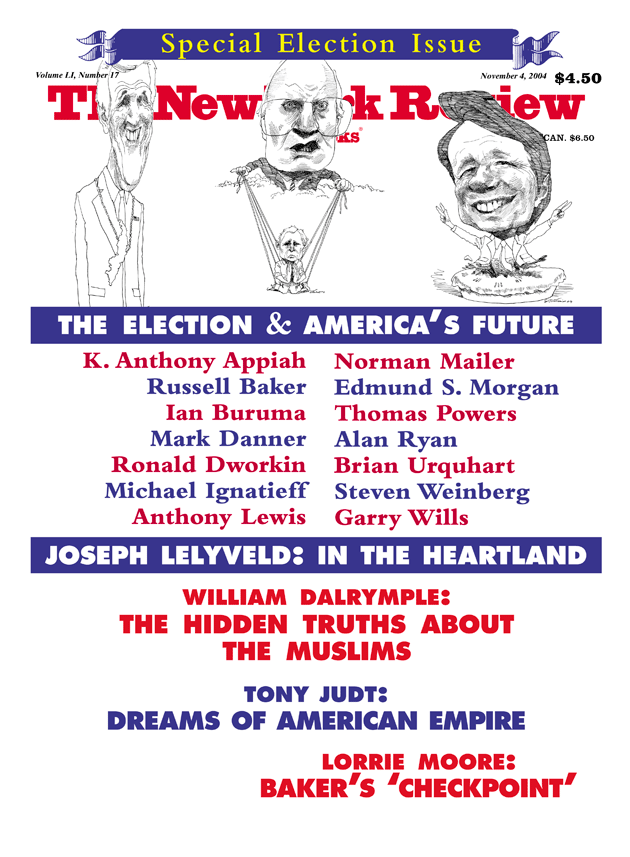To the Editors:
There is a major error in Frederick Crews’s take on the Rorschach test, “Out, Damned Blot!” [NYR, July 15], for which he cannot be faulted because his essay relied almost exclusively on the one book he reviewed. Had he also consulted other scholarly works, he might have reached quite a different conclusion. What’s Wrong with the Rorschach? is admirable in its accounting for the flaws and shortcomings of the test, the way it was historically oversold, and its initial uncritical acceptance, but it systematically underreports and minimizes evidence of the test’s validity.
One would never know from reading either What’s Wrong with the Rorschach? or Crews’s review that considerable empirical evidence attests to the utility of the Rorschach when it is properly used. In 2001, a blue ribbon panel of experts on psychological assessment assembled by the American Psychological Association’s Board of Professional Affairs published a report on the effectiveness of a number of psychological tests. One of the conclusions from this exhaustive study of the literature (one table alone presented 259 validity coefficients) was that the Rorschach (and another projective test of personality, the Thematic Apperception Test) can predict behavior as effectively as the more “scientific” self-report scales. What’s Wrong with the Rorschach? deals with this impressive statement by questioning the objectivity and competence of the members of the panel. Crews deals with the panel report by totally ignoring it.
Both Crews and What’s Wrong with the Rorschach? provide a useful service when they emphasize that when the Rorschach is interpreted impressionistically and intuitively it shows minimal empirical validity. However, when clinical intuition and experience are removed from the interpretation process and applied to the systematic construction of objective scoring methods, the Rorschach shows impressive evidence of describing complex human motivation and behavior. Rorschach responses can be scored and categorized in a number of ways, the best known of which is John Exner’s Comprehensive System (CS). The merits of the CS have lately come under withering criticism, described in Crews’s review. However, over four hundred published studies attest to the validity of a number of non-CS objectively scored Rorschach systems. Crews does not refer to any of this literature. In their commendable effort to rid psychology of fakery, What’s Wrong with the Rorschach and Crews have inadvertently also rejected a useful, unique method of personality assessment.
Joseph Masling
Professor Emeritus
Psychology Department
State University of New York at Buffalo
Buffalo, New York
Frederick Crews replies:
Joseph Masling’s letter asks us to take a good deal on faith. The same “clinical intuition and experience” that he judges to be worthless in “the interpretation process” are deemed to be somehow dependable when “applied to the systematic construction of objective scoring methods.” Although Masling claims that “a number” of Rorschach systems have been successful, he fails to supply their names. And we have only his word that “four hundred published studies”—also unidentified—are immune to the devastating critiques assembled in What’s Wrong with the Rorschach?
Masling’s vagueness, I suspect, stems from his wish to avoid putting on view his partisan stake in keeping the wounded Rorschach on life support. He is a devoted if selective Freudian, and one of the prin-cipal sources of his cited evidence favoring certain psychoanalytic propositions has been the supposedly informative Ror-schach test. Indeed, Masling is the deviser of a “Rorschach Oral Dependency Scale” purporting to justify a Freudian constellation of traits by correlating it with Rorschach scores. Thus he is doubly committed to the test, first as a potentially trustworthy instrument in itself and then as a means of helping to prove Freud right on essential points of doctrine.
No one denies that personality can occasionally affect perceptions of ambiguous stimuli and thus leave a faint trace on Rorschach results. But the crucial question, which Masling blithely disregards, is whether we can be confident that impulsive responses to the inkblots by individual test takers possess diagnostic value. Here the record is overwhelmingly and scandalously negative. Rorschach experts have shown themselves to be incapable of distinguishing between deeply revelatory responses and those that reflect only a casual memory or whim. That is why Masling’s “useful and unique method of personality assessment,” in its routine daily application, generates harmful misidentifications of pathology.
One would gather from Masling that the “impressive statement” issued in 2001 by “a blue ribbon panel of experts…assembled by the American Psychological Association’s Board of Professional Affairs” constituted an objective and definitively favorable verdict on the Rorschach. Yet surely Masling knows that the panel in question was created with the express purpose of persuading managed care companies and legislators to keep paying for the Rorschach and other widely criticized tests; that the panel’s funding came in part from John Exner’s Rorschach enterprises; that the group included four prominent Rorschachers but not a single dissenter; and that its report didn’t address or even allude to the accumulating mass of debunking studies.
That report claimed, absurdly, that the Rorschach test can reliably unearth a wide variety of psychological disorders, identify victims of physical and sexual abuse, and even predict the occurrence of cancer. Masling, I gather, would not want to go that far. Indeed, his letter discreetly hints that the reigning Comprehensive System is nothing but a sham. As the originator of a Rorschach scale in his own right, however, he is willing to tolerate patent quackery in the APA statement for the sake of shoring up his own small wing of the collapsing Rorschach edifice.
This Issue
November 4, 2004


